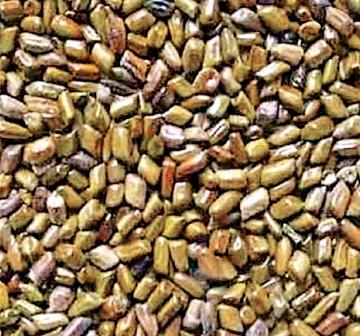
Panewar seed (Cassia tora)
Common names: Kuvadia seeds, Stinking Cassia, Chinese senna, Foetid cassia, Java bean, Low senna, Peanut weed, Sickle senna, Sicklepod
Local names: Assamese: Bon medelua, Dari diga, Medeluwa Bengali: Panevar, Chakunda Hindi: Panwar, Chakunda, Chakvat Kannada: Sogata Malayalam: Sakramardakam Manipuri: Thaunum namthibi Marathi: Takla, Tankala Mizo: Kelbe-on Oriya: Chakunda Tamil: Senavu Urdu: Panwar, Panevar, Tarota
Cassia is a small erect hairlesss shrub, about 1 m tall, commonly found growing wild on roadsides. According to rough estimate about 0.030 million tones seeds are available annually, but the collection is hardly 30-35% in India. It is good source of energy and protein (TDN 55% and CP 16%) for cattle.
Deleterious factor
The seeds contain 0.083% crysophanic acid which is considered to be anti-nutritional factor. Kuvadia seeds have some odour that animals do not like which makes them unpalatable. The tannic acid content is very low i.e. 0.8%.
Detoxification
Most of the toxic factor is removed during fresh water treatment. Soaking the seeds in cold or hot water removes 28.3% and 37.5% chrysophanic acid, respectively.
Inclusion
As such they are not palatable but if seeds are boiled and mixed with other concentrates, animals very well consume it. The seeds after grinding can be incorporated at 15% level in the concentrate mixtures of bullocks and lactating cows (Punj, 1988). Unboiled panewar seeds can be incorporated up to the level of 10% in the concentrate mixture of cows without affecting milk yield and composition.
